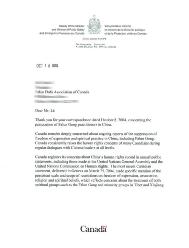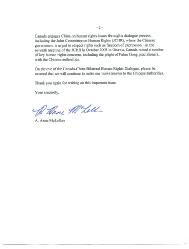Deputy Prime Minister Anne McLellan Writes to the Falun Dafa Association of Canada Regarding the Canada-China Bilateral Human Rights Dialogue
(Clearwisdom.net) The Annual Canada-China Bilateral Human Rights Dialogue was held in Beijing on October 11-14, 2004. The Falun Dafa Association of Canada wrote a letter to Canadian authorities before the Canadian delegation traveled to Beijing. The letter pointed out that at least 260 Falun Gong practitioners were tortured to death since the last dialogue a year ago. The letter provided related evidence of severe persecution of 120 Canadian Falun Gong practitioners and their relatives, and asked the Canadian government to urge the Chinese government to stop the persecution.
Before their departure to Beijing, the Canadian delegation had informed the Falun Dafa Association of Canada that the issue of Falun Gong would be raised in the dialogue. It is known that the Canadian government raised the issue of Falun Gong in the dialogue in Beijing on October 11, 2004. Chinese government representatives did not defend the situation as in previous years, instead, they simply remained silent.
On October 18, 2004, Deputy Prime Minister A. Anne McLellan replied to the Falun Dafa Association on the Annual Canada-China Bilateral Human Rights Dialogue. She said in the letter: "Canada remains deeply concerned about ongoing reports of the suppression of freedom of expression and spiritual practice in China, including Falun Gong." Below is the text of the letter from Deputy Prime Minister McLellan.
Deputy Prime Minister and Minister of Public Safety and Emergency Preparedness Canada
Ottawa, Canada
The Honourable A. Anne McLellan, P.C.
October 18, 2004
Falun Dafa Association of Canada
Dear Mr. Li:
Thank you for your correspondence dated October 8, 2004, concerning the persecution of Falun Gong practitioners in China.
Canada remains deeply concerned about ongoing reports of the suppression of freedom of expression and spiritual practice in China, including Falun Gong. Canada consistently raises the human rights concerns of many Canadians during regular dialogues with Chinese leaders at all levels.
Canada registers its concerns about China's human rights record in annual public statements, including those made at the United Nations General Assembly and the United Nations Commission on Human Rights. The most recent Canadian statement, delivered in Geneva on March 25, 2004, made specific mention of the persistent scale and scope of restrictions on freedom of expression, association, religion and spiritual beliefs, which reflects concerns about the treatment of both spiritual groups such as the Falun Gong and minority groups in Tibet and Xinjiang.
Canada engages China on human rights issues through a dialogue process, including the Joint Committee on Human Rights (JCHR), where the Chinese government is urged to respect rights such as freedoms of expression. At the seventh meeting of the JCHR in October 2003 in Ottawa, Canada raised a number of key human rights concerns, including the plight of Falun Gong practitioners, with the Chinese authorities.
On the event of the Canada-China Bilateral Human Rights Dialogue, please be assured that we will continue to make our views known to the Chinese authorities.
Thank you again for writing on this important issue.
Yours sincerely,
A. Anne McLellan
 |  |